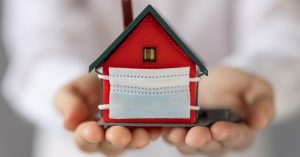 Florida Gov. Ron DeSantis signed SB 72 into law on March 29. For some time, volunteer community association boards, their managers, and professional advisers have worried that private residential communities might be subject to potential claims related to how the board managed (or in some cases, mismanaged) the COVID-19 pandemic. For the past year, many association boards have, thankfully, followed the safety guidelines set forth by the CDC, as well as adhered to local state and county orders regarding facial coverings in common areas, social distancing and amenity operations.
Florida Gov. Ron DeSantis signed SB 72 into law on March 29. For some time, volunteer community association boards, their managers, and professional advisers have worried that private residential communities might be subject to potential claims related to how the board managed (or in some cases, mismanaged) the COVID-19 pandemic. For the past year, many association boards have, thankfully, followed the safety guidelines set forth by the CDC, as well as adhered to local state and county orders regarding facial coverings in common areas, social distancing and amenity operations.
These boards understood that the state and local orders were the minimum or “floor” of the protocols they should be enforcing, but certainly not the ceiling. Communities were advised to take into account their specific demographics, the type and number of recreational amenities they were managing, the presence or absence of active COVID infections in their community and the surrounding area, and their residents’ willingness or refusal to adhere to safety protocols when crafting and enforcing their rules.
It is unlikely that any community association director fully anticipated a pandemic prior to 2020, but the vast majority did step up and implement the necessary safeguards despite very vocal resident pressure in many communities to open everything up.
Despite the fact that most associations in Florida lack insurance coverage for COVID-19 claims, the most common rationale from owners and board members pushing for the relaxation of safety protocols has involved the question of how someone would be able to “prove” that a COVID illness or death stemmed from the community’s common areas or the association’s failure to enforce social distancing and facial coverings.
Naturally, there were two forces at play: those residents who threatened lawsuits because the safety protocols were too rigid and interfered with their rights to use the pool, gym and other amenities, as well as to sell or lease their property, and those residents who threatened lawsuits because their board was not doing enough to safeguard their health and wellbeing.
The overarching question we community association practitioners heard involved the extent of possible liability on the part of the association and individual directors for COVID claims.
This new law provides civil immunity to business entities, not-for-profit corporations, hospitals, nursing homes, government entities, schools and churches for COVID-19 related claims as long as the alleged negligence doesn’t involve gross negligence or intentional misconduct. A “COVID-19 related claim” means a civil liability claim against a person, including a natural person, a business entity, an educational institution, a governmental entity or a religious institution, which arises from or is related to COVID-19.
The term includes any such claim for damages, injury or death. Florida condominiums, cooperatives and homeowners’ associations are classified as business entities protected by this bill, which is welcome news. However, the new law is not a protective blanket under which all associations can take shelter regardless of how they handled this crisis.
The new law imposes significant legal hurdles for individuals who want to sue over coronavirus-related injuries or deaths.
Plaintiffs who file suit will need to provide a physician’s affidavit to establish the basis for the injury claim. They will also need to prove in court that a defendant did not make a good faith effort to comply with public health standards and to prove that a defendant com- mitted gross negligence under a “clear and convincing” evidentiary standard.
The law establishes a one-year statute of limitations to sue from the later of the date of death, hospitalization or the COVID-19 diagnosis that forms the basis of the claim. This newfound statutory protection applies to claims that accrued before the enactment of the law and within one year following the governor’s signing of it, but it does not apply to lawsuits that have already been filed.
The association boards who took steps (and continue to take steps) to comply with local, state and federal guidelines should be able to rely upon this new law for protection. It is important for battle- weary boards to remember that Florida is still under a statewide state of emergency until April 27.
Florida’s population has not been fully vaccinated at this point, and federal and local health officials continue to warn of possible surges due to variants. Many county ordinances requiring facial coverings in association common areas remain in effect. Hopefully, this helpful new law will not create a false sense of security for community leaders who are racing towards a return to normal.
It is not only reasonable but prudent for boards to continue to exercise due caution when operating and opening com- mon amenities and enforcing COVID-19 safety protocols.
To read the original article, please click here.
Donna DiMaggio Berger is a Board Certified Specialist in condominium and planned development law, a shareholder at Becker & Poliakoff, and the executive director of the Community Association Leadership Lobby. To learn more about Donna, please click here.